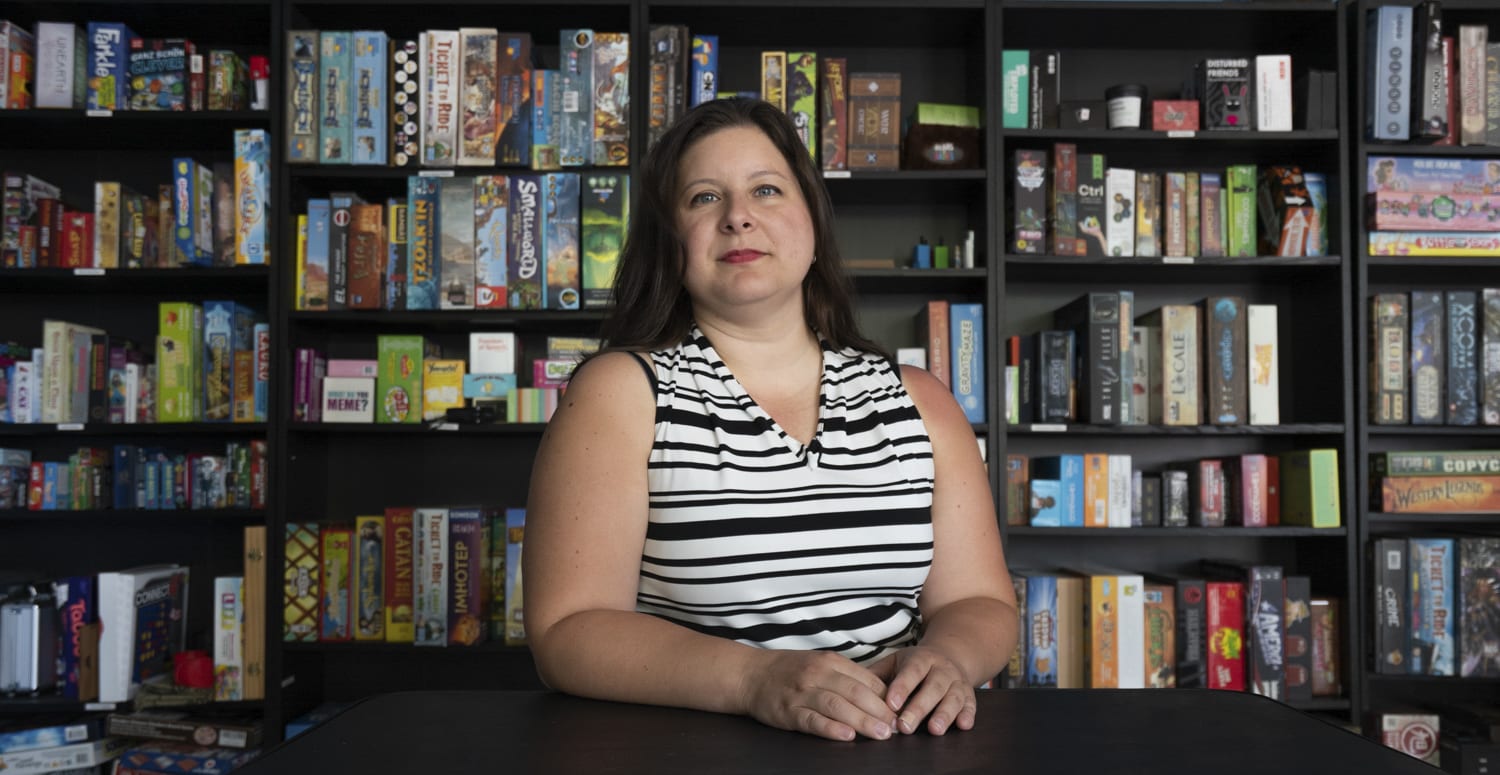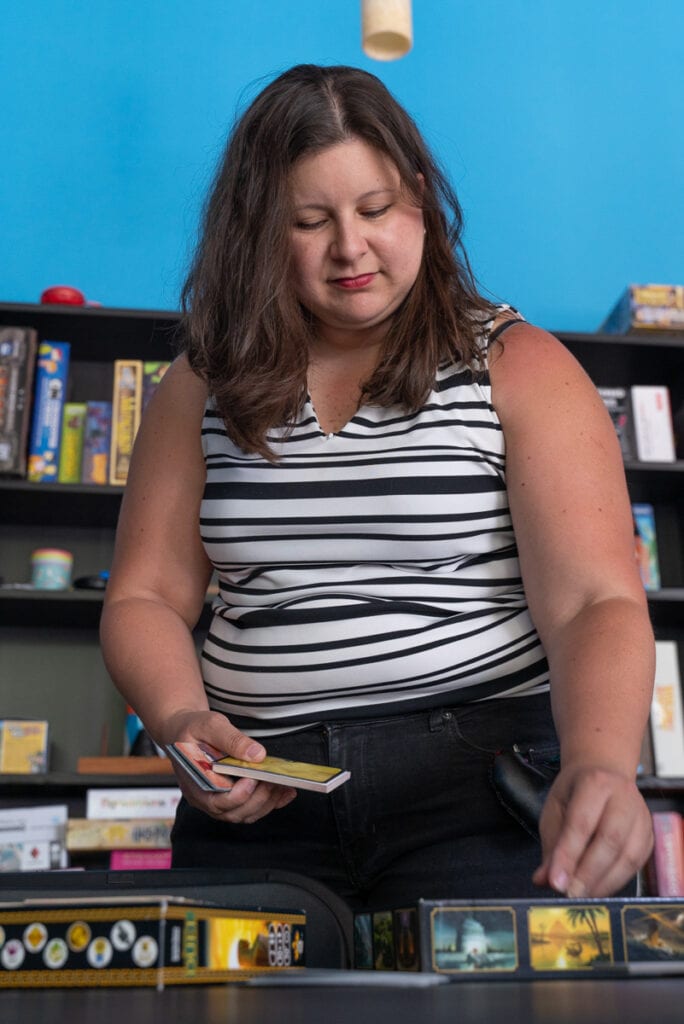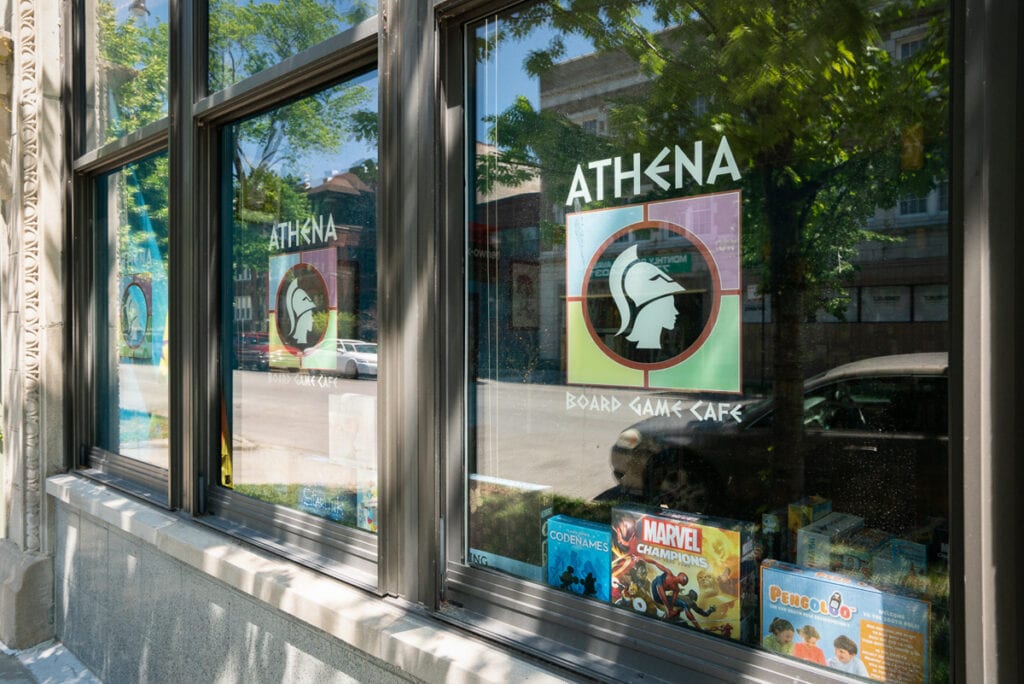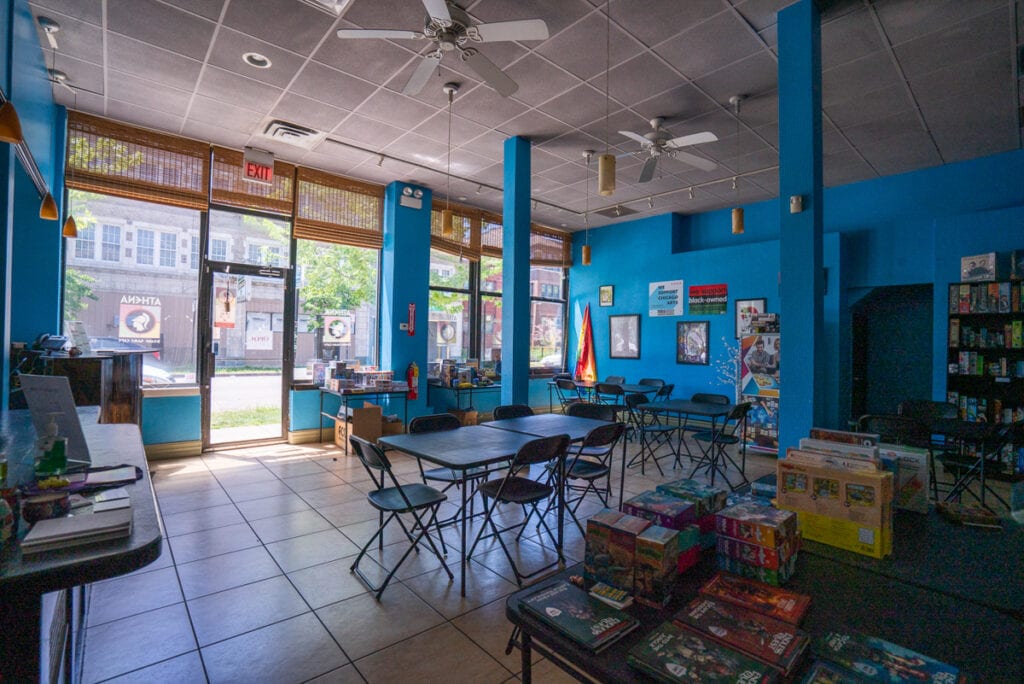 Fotografía de Camilla Forte/Borderless Magazine
Fotografía de Camilla Forte/Borderless MagazineTras años en el mundo empresarial, Patricia González decidió dedicarse al proyecto que la apasionaba en Chicago. Lo abrió justo cuando la ciudad se apagaba debido al COVID-19.
Patricia González se trasladó inicialmente a Michigan desde Venezuela para cursar un máster. Casi una década después, llegó a Chicago y empezó a trabajar en el proyecto de su pasión: una cafetería donde la gente pudiera reunirse y jugar a juegos de mesa. Después de buscar locales, conseguir permisos y probar distintos juegos de mesa, por fin estaba lista para abrir. Café Athena de juegos de mesa en Rogers Park. Por desgracia, la pandemia mundial amenazó su visión de reunir a la gente. En marzo de 2020, tras debatir si debía abrir o no, González decidió persistir y se dio cuenta de que tenía que ser más creativa cuando abriera el negocio.
Como parte de nuestro serie sobre cómo los restaurantes de inmigrantes han sobrevivido a la pandemiaGonzález contó su historia a Borderless Magazine.
Crecí en Caracas, Venezuela. Mi madre era madre soltera y soy la segunda de dos hermanos.
Estudié ingeniería de producción en una de las mejores escuelas de ingeniería de Venezuela, Universidad Simón Bolívar. Era muy emprendedor - sobre gestión de costes, fijación de precios y estudio de la industria o la producción.
La primera vez que vine a Estados Unidos fue en 2007 para cursar un MBA en la Universidad de Michigan. Me intrigaba la idea de ir a un lugar diferente, hablar otro idioma y estar en un entorno distinto. Parecía un reto, y me encanta lo que va a ser difícil. Recuerdo que senté a mi hija para decirle que íbamos a mudarnos a un lugar llamado Michigan. Entonces tenía 4 años y sólo hablaba español, así que sólo podía decir "Mi-chi-gah". Un par de meses después apenas hablaba español. Yo pensaba: "Un momento, ¿qué ha pasado aquí?". Se adaptó bien aquí y realmente le encantó.

Patricia González hace los últimos ajustes y se asegura de que todos los juegos estén ordenados antes de que lleguen los clientes a Athena Board Game Cafe, 1418 W. Howard St., Chicago, Illinois, a última hora del día. Foto de Camilla Forte/Borderless Magazine.
Después de licenciarme, me contrataron en una empresa de Michigan. Me gustaba estar aquí, así que decidí quedarme un poco más. Además, las cosas en mi país empezaban a ponerse un poco más difíciles. Hugo Chávez llevaba unos años de presidente, el precio del petróleo empezaba a bajar, había muchos desabastecimientos y era difícil encontrar productos. La inflación también empezaba a subir.
Como parte del trabajo, me enviaron a Italia. Me fui con mi hija a vivir y trabajar allí durante dos años, cuando ella tenía 13.
Fuimos a Londres y uno de los sitios que visitamos fue una cafetería de juegos de mesa llamada Draughts. Era de aspecto industrial, y tenían un menú enorme, una biblioteca enorme y una gran variedad de juegos. Fuimos durante el día y pasamos allí cuatro o cinco horas.
Esa idea se me quedó grabada en la cabeza: que si en algún momento abría un negocio, eso es lo que me gustaría hacer. Siempre pensé que tendría un negocio, pero siempre sentí que tendría que ser algo un poco único. Algo creativo. Que fuera como yo. En la cafetería puedo ser creativa con un nuevo menú, con una exposición de juegos o con promociones o eventos. Durante las fiestas, por ejemplo, hice "25 días de juegos", con la recomendación de un juego de mesa para cada día.
A finales de 2018, me mudé a Chicago. Debido a la mudanza a la ciudad, el café comenzó a ser más una posibilidad real para mí. En general, hay una cafetería de juegos de mesa en cada ciudad importante de Estados Unidos, y una en cada ciudad universitaria. Así que sin duda era algo que no era un mercado saturado, que tenía potencial.
Durante nuestra estancia en Europa, uno de nuestros lugares favoritos fue Atenas, donde hicimos un recorrido mitológico. Nos encantó la historia de Atenea: toda la conexión entre personajes guerreros, estrategia y juegos de mesa estaba ahí, así que supimos que llamaríamos Atenea a esta idea.

Athena Board Game Cafe, 1418 W. Howard St., Chicago, Ill., abrió sus puertas al público a principios de mayo de 2020. Fotografía de Camilla Forte/Borderless Magazine.
Cuando era pequeña, jugaba a juegos de mesa con mi hermano y mis primos; empecé el Monopoly muchas veces, ¡pero nunca lo terminaba! Cuando mi hija tenía 8 o 9 años, empezó a jugar a las damas y empezamos a buscar otros juegos para jugar juntos. Lo que me encanta de los juegos de mesa es que son retos divertidos, sin nada en juego. Si metes la pata o acabas el último, no te va a pasar nada malo.
En 2018, cuando empecé a tomarme en serio el café, empecé a comprar juegos cuando estaban a la venta en línea, o en la Feria de Juguetes y Juegos de Chicago. Leí toneladas de reseñas, recibí recomendaciones de amigos. Todo lo que pude absorber, lo hice.
Buscaba un barrio no sólo para vivir, sino también para abrir una cafetería. Rogers Park es muy inclusivo; hay mucho arte alrededor, así que es muy vibrante. La gente se conoce y apoya a las pequeñas empresas del barrio. Todas las piezas encajaron.
Firmé el contrato de alquiler de la cafetería en diciembre de 2019 y tomé posesión el 15 de enero. El 7 de marzo fue cuando las cosas empezaron a cerrarse. Mi proceso de licencia comercial estaba en marcha y ya había invertido bastante. ¿Sigo adelante o lo cancelo todo? Me senté, hice números y pensé que iba a poder seguir adelante.
Seguir leyendo
Pasé todas las inspecciones y finalmente me dieron el visto bueno para abrir a principios de mayo. Tenía un menú reducido, pero pensé que era mejor empezar ahora y dar a conocer un poco mi nombre, aunque solo fuera con comida para llevar.
Mi ancla es un sándwich de queso a la plancha aliñado, que se hace con aceite de oliva y orégano. Mi postre principal, el parfait de crema de lima Alicia, es una receta que mi madre solía hacer cuando yo era pequeña. El único trabajo real en un restaurante que había hecho fue cuando era adolescente en un lugar en Venezuela llamado American Deli que hacía batidos, así que eso también quedó archivado en mi mente.
Le dije a todo el mundo en Facebook que estábamos abiertos. La gente vino el primer fin de semana a apoyarnos y a comprar su sándwich o su batido. Mi hija y yo añadimos más cosas al menú: más sándwiches y nuestras ensaladas. Cuando nos permitieron abrir al por menor, empezamos a traer juegos para vender. La comida está bien pero, al final, los juegos de mesa son el negocio principal.
Los puzles se vendieron como rosquillas. Durante las fiestas hubo mucho interés por los juegos familiares. Muchas parejas también compraron juegos para dos personas, una tendencia que va en aumento.

Además de ofrecer una amplia zona de juego y servicio de cafetería, Athena Board Game Cafe también alberga una pequeña tienda donde los clientes pueden comprar juegos para añadir a sus colecciones caseras. Fotografía de Camilla Forte/Borderless Magazine.
Cuando el verano pasado nos permitieron abrir para comer, me emocioné mucho y contraté a tres personas. Abría muchas más horas, pero seis semanas después decidí que no podía permitírmelo. Tuve que despedirlos, me sentí fatal. Ahora sólo estoy yo, y decidí reducir el horario a sólo jueves, viernes, sábado y domingo. Mi hija trabaja conmigo los sábados y domingos. Así que es muy divertido, y es cuando tengo un poco más de tráfico. Cuando empecé, me planteé dos escenarios: o estoy a plena ocupación, o estoy a media ocupación - 22 personas a la vez. Ahora mismo, en un buen día, tengo entre seis y ocho personas.
Durante la pandemia, no he podido operar con beneficios. La única ayuda a la que tuve derecho fue para la subvención del Programa de Hospitalidad de Chicago. Fue prácticamente la única ayuda que recibí porque empecé en 2020. Para poder optar a la APP federal y a algunos de esos otros recursos, tienes que demostrar que estabas abierto en 2019.
Esta subvención cubrió mis gastos operativos durante tres meses. Realmente me ayuda a mantener las luces encendidas.
Me lo comunicaron de cuatro formas distintas: directamente el ayuntamiento, el BACP (Business Affairs and Consumer Protection), la oficina de la concejala y Howard Street Chicago. Howard Street Chicago es un área de servicios especiales, una de esas zonas en las que la ciudad invierte más para desarrollar la comunidad. Howard Street Chicago utiliza ese dinero para hacer marketing adicional. Así que la parada de autobús que hay frente a mi cafetería tiene mi cara. Estos recursos son fantásticos porque te hacen sentir que no estás solo. Que hay toda una comunidad que quiere que triunfes, que quiere ayudarse mutuamente a triunfar.
No cabe duda de que Athena's tiene potencial para convertirse en un centro neurálgico de la comunidad, pero eso no sucede por sí solo. Es difícil exponerse, ser vulnerable, presentarse, incluso comprometerse a pasar un par de horas con gente que no conoces.
Por eso me centro en actos que puedan tranquilizar a la gente, como juegos de trivial o sesiones didácticas, para que la gente se sienta cómoda aprendiendo algo nuevo.
Lo bueno de los juegos de mesa es que eliminan muchas de las incomodidades. Aunque no encuentres nada de lo que hablar, hay una actividad que estás haciendo y puedes centrarte en ella. También se trata de que la gente esté dispuesta a probar algo nuevo. Muchas veces la gente dice que no le gustan los juegos de mesa, pero hay tantos tipos diferentes que seguro que algo va a funcionar.
Este reportaje se ha realizado con la ayuda del Metro Media Lab, un proyecto de la Medill School de la Northwestern University destinado a reforzar el periodismo en Chicago. Está financiado por la Fundación Robert R. McCormick.
